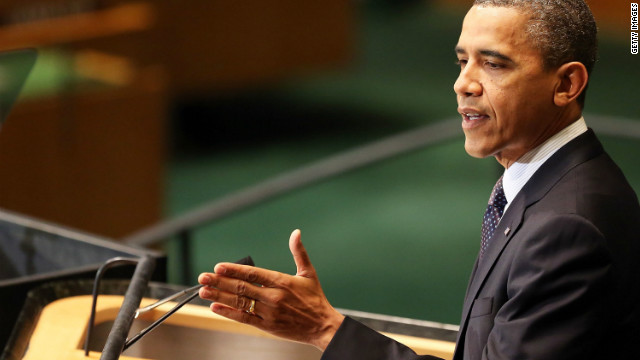Really, Fareed Zakaria? Really? You're tanking for the Apologist-in-Chief at the U.N.? (Notice how most of the... http://fb.me/1CGRDRGL5
11:13 PM - 27 Sep 12 · Details

September 25th, 2012
07:20 PM ET
Obama steps up over freedom of speech
By Fareed Zakaria
Mitt Romney and his campaign feel that they have an opening in the presidential campaign, on foreign policy at least. The unrest in the Middle East the past couple of weeks, including the killing of the American ambassador to Libya and widespread protests over a controversial YouTube video that has been condemned as blasphemous, has left a general sense of turmoil in the region. The Romney campaign wants to take advantage of it.
On the surface, it seems like a reasonable idea. And Obama has made some missteps including the inexplicable decision to not meet with any foreign leaders this week during the U.N. General Assembly. But I don’t think it will work. And one need look no further than President Obama’s speech at the General Assembly to see why.
International events, even crises, typically help the president because they make him look, well, presidential. The symbolism of Obama delivering a speech at the United Nations will have been a powerful reminder to the public that Obama isthe president and Mitt Romney is not. This in turn has the effect of conferring a certain gravitas on the incumbent.
The second reason why Romney is unlikely to be able to turn the current turmoil to his advantage, for now at least, is that Obama’s speech was very good. The president was able to play to his strengths in explaining events, placing them in a broader context, and acting as a kind of bridge to the rest of the world by explaining American concerns to an international audience while still showing an understanding of some of the international community’s worries.
But it was also a clever speech politically, as Obama was able to steal Republicans’ fire on two crucial issues.
Obama began the speech with an homage to Ambassador Chris Stevens, countering the claim that he was minimizing the death of the ambassador or viewed it as just a “bump” on the road. In addition, Obama defused the criticism of many conservative commentators by making a robust defense of freedom of speech. Bret Stephens' column in the Wall Street Journal, for example, was constructed as the speech Mitt Romney should be giving at the Clinton Global Initiative in New York this week – as it turns out, many of the key points in Stephens’ column were actually made by Obama.
Obama’s speech wasn’t just good politics – it was good policy. He reminded the world that people like Ambassador Stevens represent an element of U.S. foreign policy that is often forgotten – deep-rooted idealism and a desire to understand different countries and cultures. Stevens, who was a fluent Arabic speaker, was committed to treating the Libyan people as equals, and helping them better their own lives.
Similarly, Obama’s decision to robustly defend freedom of speech was exactly right. In most such crises in the past – the Koran burning, Danish cartoons – the U.S. government’s position (during both the Bush and Obama administrations) has typically been to condemn these acts or publications to show that we don’t denigrate Islam.
That’s fine, but it was high time that the president also said “Yes, we are appalled by this appalling video, but a core principle of free societies is that things don’t get banned just because we think they are appalling.” And by defending free speech and its constitutional sanctity, and urging the Arab World to be more tolerant, President Obama spoke truth to power in a way that was effective domestically, but also the right thing to say internationally.

